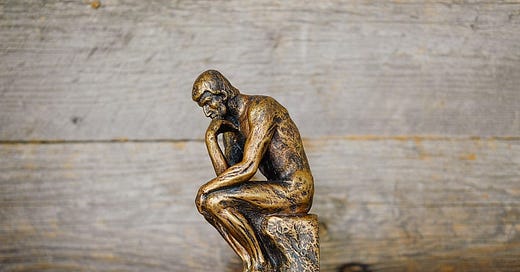Somewhere Over the Rainbow There’s Reality
A Plea with Personal Growth Addicts to Drop the Wisdom Pills

I asked ChatGPT to list for me the top five clichés used in contexts related to mindfulness. It listed the following:
“Be present in the moment.”
“Breathe deeply and let go of your thoughts.”
“Mindfulness is the key to happiness.”
“Pay attention to your senses and the world around you.”
“Mindfulness is about accepting things as they are without judgment.”
The issue I take with these, and other, similar statements is that they simplify complex, and very personal, inner journeys in frozen slogans that seem to create a certain kind of ideology.
As a consequence, sometimes people use such “wisdom pills” to justify their actions, or in an attempt to rationalise their wishful thinking. For example, they may justify frivolous behaviour by claiming to be seizing the day and living in the present, or deceive themselves that they have “let go of negativity”.
There is a certain version of hybris, a contemporary ego growing and feeding on the self-righteousness of using these terms to project themselves as deep, open-minded, advancing towards enlightenment.
Further still, the cult around these slogans is then attacked by opponents, who will dismiss such “truths” by exposing their inadequacy. The problem is, that inadequacy is not of the notions themselves, but of the simplistic interpretation put in circulation mostly by those who keep parroting them in their self-accommodating — or just naïve — way.
I have no problem if people disagree with what Buddha says; but it may be exasperating if they disagree with what THEY think Buddha says.
There are quite a few such myths and clichés that end up compromising instead of promoting a more balanced way of seeing “life, the universe, and everything”. The ones that easily spring to my mind are:
The divide heart vs mind; “do what your heart tells you” — but which voice is that of your heart? Is the heart every emotion? Is the mind cold and intellectual, and the heart warm and real?
Manifesting; “wish for it and it will come true” — can I manifest a Porsche, please? (see Manifesting is Bullshit by Robin Wilding on Medium)
“Live in the here and now”, “be present” — does that mean ignore the consequences? Or go for whatever I’m in the mood for, right now?
“Getting out of the comfort zone” — do I have to, really? As a rule?
“Think positively” — or are you deluding yourself?
“Master your mind” — or repress it?
“Know yourself “— is that knowing your character and tastes?
“Let go” — how is this different from hushing worries off, discarding responsibility, or simply taking a reflection process to its end?
I’m starting here a short series of essays on these notions or statements, over the next few weeks. I’m going to try to explain how I understand them, and how they tend to be misunderstood and either upheld like gospel laws, or argued against as humbug.
There’s an old Romanian tale of a (not very bright) farmer who sets out to the market town in a horse-pulled wagon to sell one of his horses, but the wagon crashes against a log on the way and the horses get killed. The farmer trades the wagon for an ox with a traveller passing by. He goes further and the ox gets its legs stuck in the mire. A man walks by and offers to trade his goat for the farmer’s ox. Our farmer goes on, happy with the barter. The goat is stubborn and digs its heels in and won’t budge. Our farmer trades it for a barrow. But then the trail goes up a hill and he scratches his head. Just then another guy happens to walk past and they trade the barrow for a goose. The goose soon starts getting noisy and pecky, so the farmer trades it for two plastic bags, which he holds in his hand while marching cheerfully into the marketplace.
I wonder what he would trade the bags for.
Commodities used to be things to grasp with the hands. Now they are often things to be grasped with the mind. Information as commodity is already a long outdated notion. The thing to trade in is now wisdom. Bite-sized, of course, digestible, not that the aspiring wise guys get sick and break down with so much wisdom.
DIY wisdom packages are supplied in excess on social media, where the self-taught know-it-all’s set themselves up right away as gurus to their circle of acquaintances. The trade goes: I give you a quote, you give me your likes and shares. Wisdom pills against ego reassurance. Who I quote is almost irrelevant, as long as there’s a graphic background and a name under it — this primes viewers into assuming it should be something worth quoting. Whether it’s really Einstein that said it, or a neighbour in a deep conversation just back from the Friday shopping, is also of little effect.
Behind a wisdom pill there’s a full-body narrative and a cosmos of experience. It’s the first-person narratives that count.
Wisdom is acquired by experience rather than by slogans. Trade the horse, not the plastic bags. Trade in pills and you’re trading in plastic bags.
And you?

Do you have a favourite maxim for self-regulation? Do you think it works for you roughly the same way it does for others - or maybe it doesn’t work for others at all?
Do you also feel that some of these mindfulness mottos are phoney? Or, alternatively, that they are misunderstood? Is there one that you find particularly annoying for that reason?
Tell me if you’d like me to write on any one particular mindfulness cliché.





